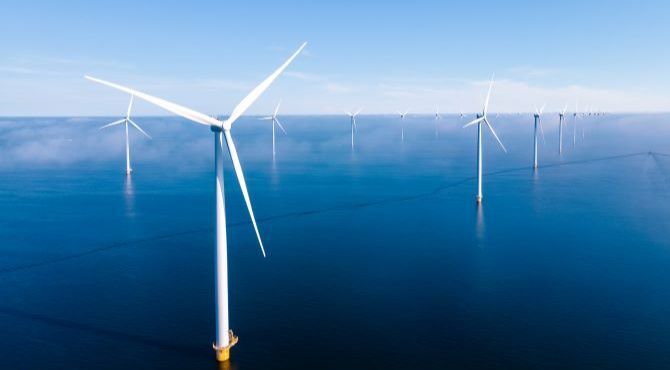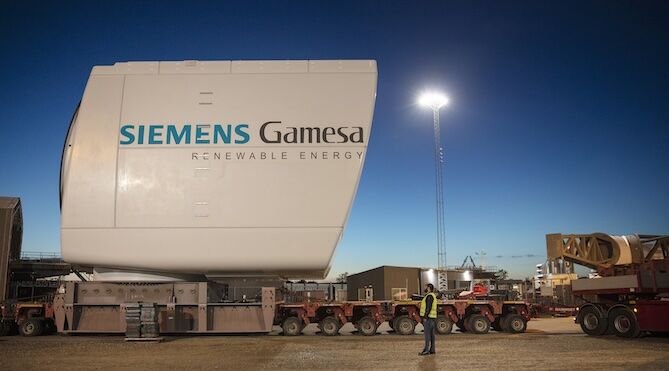UK green energy jobs boost
A UK factory in Hull has won a contract worth more than £1 billion to supply turbine blades for a new wind farm in the North Sea — a move hailed by Prime Minister Keir Starmer as another step towards making Britain "a clean air superpower".

 13 November 2024
13 November 2024This article is taken from the Winter 2024/25 issue of
Relocate Think Global People magazine
Click on the cover to access the digital edition.ScottishPower awarded the contract to Siemens Gamesa, the wind division of Siemens Energy, which will build 64 of its flagship SG 14-26 DD turbines for installation in the East Anglia TWO offshore wind farm, located some 20 miles off the Suffolk coast.
Related reading from Relocate Global
- How sustainable is your mobility programme?
- Cambridge calls for more global collaboration on climate education
- Future-Ready Forum reveals top skills students need to thrive in the future
- Donald Trump secures second presidency: what next for global trade?
UK's green energy ambitions
The turbines will eventually provide enough green energy from the £4 billion wind farm to power almost a million homes. The contract also guarantees 1,300 jobs at the Hull factory, which has almost doubled its workforce over the past 12 months.“Our mission to make Britain a clean energy superpower will fire up our industrial heartlands and break down barriers to growth in our hard-working towns and cities," said Sir Keir. "By acting decisively and early, the UK has an opportunity to lead the world in the industries of the future — working in partnership with business like ScottishPower and Siemens Energy — creating real energy security, cutting energy bills and building jobs and supply chains in the UK."Keith Anderson, CEO of ScottishPower, said that by getting more projects like East Anglia TWO off the ground quicker would "turbo boost the UK’s supply chain" and would give companies such as Siemens Gamesa the confidence to invest in British facilities.He added: “Britain’s clean power targets are achievable, but demanding. We’ve doubled our investment and are ready to play our part with government as it gets barriers out the way to build more projects like this, alongside the electricity networks needed to ferry green, home-grown power across the country.”Billion-pound investment delivers jobs
Darren Davidson, UK vice president at Siemens Energy and Siemens Gamesa, said the deal would allow the firm to plan for the long term in Hull and came as a "real positive" for job security.“The UK is the first leading industrial country to simultaneously phase out coal power and be a leader in offshore wind," he said. "If we’re to achieve our net zero targets, it is mission critical this momentum is maintained. As well as delivering the blades to power the UK’s energy transition, our factory in Hull is acting as a catalyst for economic growth and green jobs across the region.”ScottishPower announced earlier that it planned to double its investment in the UK to £24 billion over the next three years. East Anglia TWO is one of three windfarms being developed by the company off the Norfolk-Suffolk coast which, when finished, are expected to produce sufficient green electricity to power more than 3 million homes.European energy network boost for energy exports
News of the Siemens contract came on the day Ofgem, the UK's energy regulator, announced approval of five projects to lay subsea power cables capable of powering millions of homes in Ireland and continental Europe.The cables, known as interconnectors, will link Britain to power grids in Germany, the Republic of Ireland, Northern Ireland, the Netherlands and Belgium. They form part of the government’s plan to become a net exporter of green electricity in the coming decades.The 'Guardian' reported: "Currently, Great Britain has interconnectors with a combined capacity of 11.7 gigawatts already operating or under construction, or enough to meet the power needs of more than 11m UK homes. The new projects will take this total to 12GW in 2030 as the projects begin to operate, before reaching 18GW by 2032."The new power cable projects will move ahead a week after the National Energy System Operator said Britain could become a net exporter of green electricity by the end of the decade at no extra cost to the energy system if ministers take urgent steps to tackle the UK’s sluggish regulation and planning procedures.Akshay Kaul, the Ofgem infrastructure director, said: “As we shift to a clean power system more reliant on intermittent wind and solar energy, these new connections will help harness the vast potential of the North Sea and play a key role in making our energy supply cheaper and less reliant on volatile foreign gas markets and associated price spikes."

Find out more about the Think Global People and Think Women community and events.


Subscribe to Relocate Extra, our monthly newsletter, to get all the latest international assignments and global mobility news.Relocate’s new Global Mobility Toolkit provides free information, practical advice and support for HR, global mobility managers and global teams operating overseas.
©2025 Re:locate magazine, published by Profile Locations, Spray Hill, Hastings Road, Lamberhurst, Kent TN3 8JB. All rights reserved. This publication (or any part thereof) may not be reproduced in any form without the prior written permission of Profile Locations. Profile Locations accepts no liability for the accuracy of the contents or any opinions expressed herein.



































